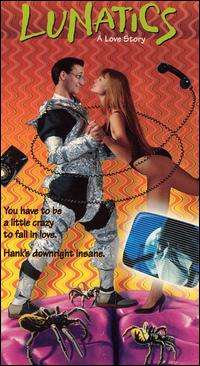Lunatics: A Love Story
Lunatics: A Love Story is a 1991 comedy romance film with neo-noir (especially psycho-noir) connections written and directed by Josh Becker, starring Ted Raimi, Deborah Foreman and Bruce Campbell. The film tells the story of a young, paranoid aspiring poet who, after an accidental phone conversation with a seemingly sweet woman, is forced to overcome his worries in order to win her heart. The film’s music was composed by Joseph LoDuca, and was edited by Kaye Davis.
| Lunatics: A Love Story | |
|---|---|
 VHS Artwork | |
| Directed by | Josh Becker |
| Produced by | Sam Raimi Bruce Campbell Robert Tapert |
| Written by | Josh Becker |
| Starring | Ted Raimi Deborah Foreman Bruce Campbell George Aguilar Brian McCree |
| Music by | Joseph LoDuca |
| Cinematography | Jeffrey Dougherty |
| Edited by | Kaye Davis |
| Distributed by | Renaissance Pictures SVS/Triumph Home Video |
Release date |
|
Running time | 87 minutes |
| Country | United States |
| Language | English |
| Budget | $650,000 |
Plot
In a rough area in Los Angeles, an aspiring poet has spent six months without leaving his apartment because of his obsessive delusions concerning cruel doctors, rappers, and spiders. Meanwhile, a woman who appears to curse things by wanting to help is dumped by her boyfriend and finds herself flat broke on the streets of LA. Soon she runs into a local gang. Due to a telephone glitch, our hero calls her at a phone booth trying to dial a "talk line" and invites her to his place. There they are forced to aid each other in overcoming their particular problems.[1]
Cast
- Deborah Foreman as Nancy
- Ted Raimi as Hank
- Bruce Campbell as Ray
- George Aguilar as Comet
- Brian McCree as Presto